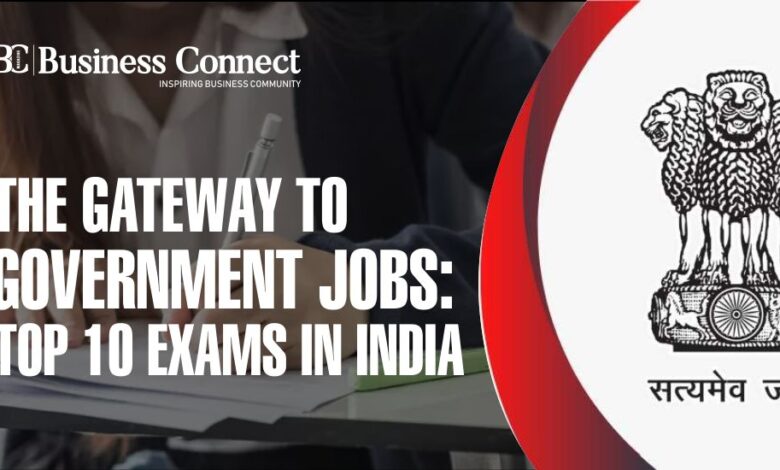Top 10 Exams In India

The Gateway to Government Jobs: Top 10 Exams in India
By Jaya Pathak
The craze for government jobs in India is truely unmatchable. Youths are facing tough competition to get their dream jobs. Lakhs of candidates appears for the competitive exams every year. Well, choosing the private or government sector as the preferance for job is completely a matter of choice. There are various govt jobs which are available for the 10th, 12th and collage pass out students. It is generally believed that getting a govt job means a lifetime security along with a handsome salary and other perks and facilities. In this article, we’ll discuss various Government exams in India.
Here presenting the list of the top 10 govt exams in India:
01. UPSC CSE:
Union Public Service Commision conducts the civil services exams. It is a national level exam and is considered the toughest exam in India. Every year lakhs of candidates appear in this exam for the post of IFS, IAS, IPS, IRS. It is conducted in three stages- Prelims, Mains and Interview. The minimum educational qualification to appear in this exam is a bachelor’s degree in any stream. The agelimit for the candidates is 21-32 years but there are also provisions for age relaxation.
The final selection is based on the marks obtained in the Main Examination and the interview. The Preliminary Examination is a qualifying stage, and its marks are not counted for the final ranking. Successful candidates are appointed to various services based on their ranks and preferences. They undergo training at respective academies, such as the Lal Bahadur Shastri National Academy of Administration (LBSNAA) for IAS officers. The number of attempts a candidate can make for the UPSC CSE varies depending on their category. General category candidates typically have six attempts, while OBC and SC/ST candidates have more attempts.
02. IBPS PO:
This exam is conducted by The Institute of Banking Personnel Selection for the post of Probationary Officers in banks. The minimum educational qualification to appear in this exam is a bachelor’s degree. The maximum age limit is 30 years. The IBPS PO exam consists of three main phases:
Preliminary Examination: This is the first phase of the exam and consists of multiple-choice questions covering subjects like English language, quantitative aptitude, and reasoning ability.
Main Examination: Candidates who qualify in the preliminary exam advance to the main exam, which includes sections like reasoning and computer aptitude, general/economy/banking awareness, English language, and data analysis and interpretation. Descriptive writing is also a part of the main exam.
Interview: After clearing the main exam, candidates are called for an interview by participating banks. The final selection is based on the marks obtained in the main exam and the interview.
The syllabus for the IBPS PO exam includes topics such as quantitative aptitude, reasoning ability, English language, general/economy/banking awareness, and computer knowledge. The exact syllabus may vary from year to year, so candidates should refer to the official notification for detailed information.
03. SBI PO:
It is conducted by State Bank of India for selecting the candidates for the post of Probationary Officers. The candidate must fullfill all the eligibiltycriterian in order to appear in the exam. The candidate must be a graduate from a recognized university. The SBI PO syllabus covers a range of subjects, including banking awareness, current affairs, English language skills, quantitative aptitude, and reasoning ability. The SBI PO recruitment process consists of three phases:
Preliminary Examination: This phase includes objective-type questions in subjects like English language, quantitative aptitude, and reasoning ability. It serves as a screening test, and marks obtained in the Prelims do not count toward the final selection.
Main Examination: The Main Examination is more comprehensive and consists of objective and descriptive sections. It includes topics like data analysis and interpretation, reasoning and computer aptitude, general awareness about the banking industry, and an English language section that includes both objective and descriptive questions.
Group Discussion and Interview: Candidates who qualify in the Main Examination are called for a group discussion (GD) and interview. The final selection is based on the marks obtained in the Main Examination and the GD/Interview.
04. SSC CGL:
This exam is conducted by the Staff Selection commission. It is conducted to recruit candidates for various Group B and Group C posts in the various ministries, departments, and organizations of the Government of India. The minimum educational qualification is a graduate degree, but it varies for different posts. The exam consists of four tiers:
Tier-I (preliminary exam with subjects like reasoning, general awareness, quantitative aptitude, and English language),
Tier-II (main exam with papers on mathematics, English language, statistics, and general studies),
Tier-III (descriptive paper in English/Hindi),
Tier-IV (skill test/computer proficiency test).
05. RBI Grade B:
The RBI Grade B exam is conducted by the Reserve Bank of India (RBI) to recruit officers for various Grade B positions in the central bank. It is a prestigious examination in India’s banking sector. The selection process comprises three phases:
Phase-I with objective-type questions on general awareness, reasoning, English language, quantitative aptitude, and economics;
Phase-II with three papers (economic and social issues, finance and management, and descriptive English); and
Phase-III with an interview.
Candidates must meet eligibility criteria, including age limits and educational qualifications. RBI Grade B officers play vital roles in monetary policy formulation and banking regulation within the RBI. The minimum qualification is 60% marks in class 12th.
06. RRB SSE:
This exam is conducted by the Railway Recruitment Board for the post of Senior Section Engineer. The educational qualification varies per the post. Senior Section Engineers hold higher-level technical positions in the Indian Railways and are responsible for more complex engineering tasks and project management.The recruitment for Senior Section Engineer positions is also done by the Railway Recruitment Board. Eligibility criteria may include a bachelor’s degree or diploma in relevant engineering disciplines, and candidates with experience may be preferred. The selection process for RRB SSE positions usually includes a computer-based test (CBT), document verification, and sometimes an interview.
07. IBPS SO:
IBPS SO (Institute of Banking Personnel Selection Specialist Officer) is a competitive banking examination in India. It is conducted by IBPS to recruit candidates for specialist officer positions in various public sector banks. The positions include IT Officer, Agriculture Field Officer, Marketing Officer, HR/Personnel Officer, Law Officer, and Rajbhasha Adhikari. Eligibility criteria vary based on the specific post but generally require specialized qualifications or experience in the relevant field. The selection process includes a preliminary exam, main exam, and interview. Successful candidates join public sector banks as specialist officers, utilizing their expertise in their respective fields to support and enhance banking operations.
08. IBPS Clerk:
The IBPS Clerk (Institute of Banking Personnel Selection Clerk) exam is a competitive examination in India for recruiting clerical staff in various public sector banks. It is conducted annually by IBPS. Eligible candidates must possess a minimum educational qualification, usually a bachelor’s degree, and meet age criteria. The selection process consists of two main phases: Preliminary and Main exams. The Preliminary exam assesses candidates in English language, numerical ability, and reasoning ability. Successful candidates then take the Main exam, which includes sections on general/financial awareness, general English, quantitative aptitude, reasoning ability, and computer aptitude. After clearing these stages, candidates are provisionally allotted to participating banks as clerks.
09. SSC CHSL:
The SSC CHSL (Staff Selection Commission Combined Higher Secondary Level) examination is a competitive exam in India for recruiting candidates to various government posts, including lower division clerks, postal assistants, data entry operators, and court clerks. Conducted by the SSC, it requires candidates to have completed their 10+2 (intermediate) education. The selection process includes three tiers:
Tier-I (computer-based exam),
Tier-II (descriptive paper)
Tier-III (skill/typing test).
The exam assesses candidates’ knowledge in English, general intelligence, quantitative aptitude, and general awareness. Successful candidates secure jobs in government offices, postal departments, and ministries, providing them with stable employment and opportunities for career growth.
10. RRB ALP:
The RRB ALP (Railway Recruitment Board Assistant Loco Pilot) exam is a prominent railway recruitment examination in India. It is conducted by the Railway Recruitment Board to fill Assistant Loco Pilot and Technician positions in the Indian Railways. Candidates with qualifications in science and mathematics are eligible to apply. The selection process consists of computer-based tests (CBT) covering topics such as mathematics, reasoning, general science, and technical subjects. Successful candidates operate and assist in maintaining locomotives and railway systems, ensuring the safe and efficient functioning of the railways. The RRB ALP exam offers opportunities for a stable government job with good career prospects in the railway sector.
Biotechnology graduates in India have several opportunities to pursue government jobs through various competitive examinations. Biotechnology graduates can appear for UPSC Combined Medical Services Examination to become Medical Officers in government hospitals and organizations. They can apply for the SSC Scientific Assistant Exam, which allows them to work as scientific assistants in the IMD. They can also appear in the exams conducted by ICAR, CSIR, BARC Exams, State & Central level exams.
Arts students in India have a wide range of government job opportunities available to them through various competitive examinations. Some popular government exams that an Arts student might consider are UPSC CSE, SSC CGL, IBPS PO, RRB NTPC, RRB JE, RRB SSE, State Public Service Commission, Teaching Exams, CDS, NDA, CAPF Exams etc.
Engineering graduates in India have numerous opportunities to pursue government jobs through competitive examinations. Some popular government exams that are suitable for engineering graduates are UPSC Engineering Services Examination, SSC JE, RRB SSE, ISRO Scientist/Engineer Exam, IES, State PSC Exams etc.
After completing B.Sc. in Agriculture, candidates have several opportunities to pursue government jobs in India. Some government job options for B.Sc. Agriculture graduates are
Agriculture Development Officer,Agriculture Officer, IBPS Specialist Officer (Agriculture Field Officer) exam, Indian Forest Service (IFS), Agricultural Research Scientist, State Agricultural Extension Officer, Food Safety Officer, Central Warehousing Corporation (CWC), NABARD etc.
Government jobs in teaching are highly respected and sought after in India. Opportunities exist at various levels such as Central Government Schools like KVs and JNVs. Various exams are conducted for the recruitment of teachers at primary, secondary, and higher secondary levels. NET and SET is conducted to offer opportunities as professors, assistant professors, and lecturers. Teaching jobs in institutions like IITs, IIMs, and NITs are highly competitive and require exceptional academic qualifications. Teaching-cum-research positions are available in institutions like CSIR, DRDO, and ISRO.
Government jobs after 10th for females in India include positions such as Anganwadi Worker, Multi-Tasking Staff, Data Entry Operator, Forest Guard, Police Constable, Para Medical Staff, Postal Assistant etc.
Government jobs for architects in India include opportunities in various government departments and organizations such as Public Works Departments, Urban Planning Departments, ASI, NIUA, HUDCO, CPWD, State PWDs.
Government jobs after completing the 12th-grade in the science stream are available in various fields in India include Defense Services, Paramilitary Forces, Police Force, Indian Railways, SSC CHSL, MTS, Stenographer etc.
Optometrists can find government job opportunities in India in the healthcare sector and other related fields. They can work in Govt hospitals and clinics, research institutes, Raiilways and Defence, State Public Health Departments etc.
BAMS (Bachelor of Ayurvedic Medicine and Surgery) graduates inIndia can explore various government job opportunities in both the healthcare and administrative sectors. Some government job options for BAMS graduates are Medical Officer, Research Officer, Pharmacist, Drug Inspector, Ayurvedic Medical Consultant, Ayurvedic Lecturer, State & Central Govt Health Departments etc.
Here are some of the official Govt websites where you can find information about various government exams in India and apply for them:
www.upsc.gov.in
www.ssc.nic.in
www.ibps.in
www.rbi.org.in
www.rrbcdg.gov.in
www.uppsc.up.nic.in
www.nta.ac.in
www.joinindiannavy.gov.in
www.joinindianarmy.nic.in
www.careerindianairforce.cdac.in
www.nabard.org
www.ongcindia.com
www.isro.gov.in






